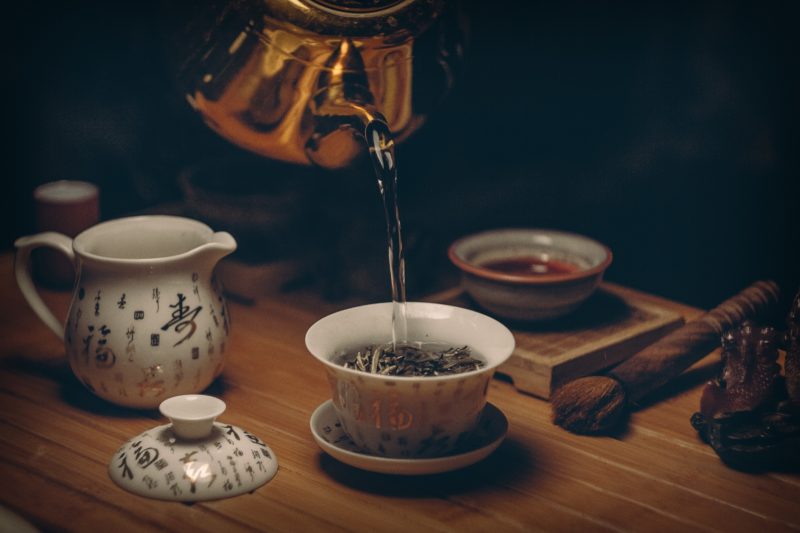By Sharon Schweitzer
Do you know what the most consumed liquid in the world is after water? Well, it is not BEER! Tea is made from the leaves of Camellia sinensis. It remains the second most consumed drink worldwide. To celebrate National Hot Tea Month, we explore five global regions where tea is a fundamental part of culture.
Here are five (5) global regions where tea is one of the most popular drinks:
- Japan: The Japanese tend to prefer green tea over other types such as black tea and consuming it daily is an important cultural custom. Various green tea styles include:
- Hojicha: A specialty green tea that is made by steaming and then roasting the leaves, giving it a distinctive caramel aroma.
- Konacha: The least expensive form of Japanese tea, using the dust or residue of the tea plant harvest.
- Matcha: The highest quality green tea leaves are collected, dried, milled, and a powder created to mix with heated water
- Ryokucha: A mix of leaves collected in three different stages of the green tea harvesting rounds.
- India: Tea is beloved in this country and Indians themselves consume almost 70% of the tea produced in India. Specifically, black teas such as Assam and Darjeeling are favorites. Masala chai which is well known for its spicy flavors of cinnamon, ginger, black pepper, cloves, and cardamom is popular. In India, chai is such a best-seller that chai wallah tea shops are a popular neighborhood gathering spot for enjoying chai in clay cups, socialization, and daily news.
- China: Experts say that tea originated in China for natural medicinal purposes. Oolong is strongly associated with spiritual beliefs practiced in China including Buddhism, Confucianism, and Taoism. Monks consume tea as an aid in seeking calm and peacefulness. Gradually, the practice of drinking tea became not just a spiritual activity but also a cultural and social one.
- British Black Tea: Tea first made it to Europe in the 16th century but did not become popular on a wide scale in Britain until the 19th century. As an aid to the slump between lunch and dinner, Brits sought a light meal with quality black tea and a dash of milk, accompanied by finger food like sandwiches, scones, or pastries. Initially, drinking tea was more of a high-class activity. Gradually, British society adopted this practice, and it has become a popular custom. Pro-tip: It is not posh or elegant to lift your pinky finger when holding the teacup. It is an act of poor taste and viewed as snobbish.
- Moroccan Green Tea: In the Arab world, drinking tea is a signal of warmth and hospitality and an invitation to commune with others over conversations. Moroccans especially love their tea traditions through their special version: Moroccan mint tea. Gunpowder green tea is brewed with fresh mint leaves in an ornate metal tea pot along with generous amounts of sugar, then poured steaming hot into glass teacups. The entire process is accomplished with flourish and care. Too sweet for you? Simply say laa sukar (no sugar), shukran (thank you).
Do you enjoy daily tea? Quality hot green or black tea is a healthy complement to life. With today’s unlimited tea options, shop online or visit your local tea house to sample a new tea flavor. It is soothing to sip your favorite tea in honor of National Hot Tea Month.
Photo by NIKOLAY OSMACHKO
Sharon Schweitzer, J.D., is a cross-cultural trainer, modern manners expert, and the founder of Access to Culture. In addition to her accreditation in intercultural management from the HOFSTEDE Centre and the Intercultural Communication Institute, she serves as a Chinese Ceremonial Dining Etiquette Specialist in the documentary series Confucius was a Foodie, on Nat Geo People. Her Amazon #1 Best Selling book in International Business, Access to Asia: Your Multicultural Business Guide, now in its third printing, was named to Kirkus Reviews’ Best Books. She’s a winner of the British Airways International Trade Award at the Greater Austin Business Awards.
#SharonSchweitzer, #AccesstoCulture, Access2Culture, #InternationalCelebration, #AccesstoAsia, #GlobalEtiquette, #Cross-CulturalTrainer, #InterculturalCommunication, #InternationalCommunication, #Interculturalist, #Etiquette, #CultureExpert, #Speaker, #KeynoteSpeaker, #CulturalIntelligence, #Culture, #greentea, #blacktea, #minttea, #tea, #teaceremony, #Japan, #China, #India, #Britian, #Morocco, #chai


Leave A Comment